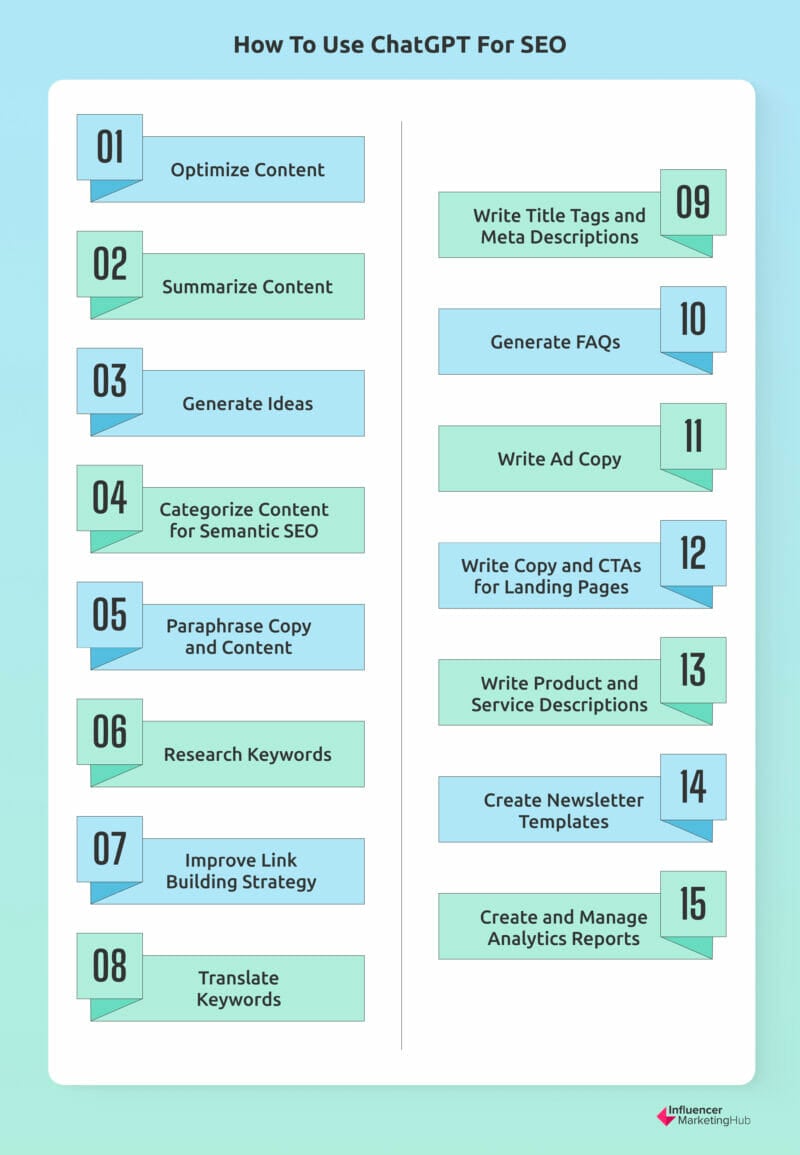ChatGPT, the chatbot that has everyone talking and debating, is arguably one of the most beneficial tools of artificial intelligence (AI). Capable of generating human-like text, ChatGPT may be controversial in some circles, but it is undoubtedly a revolutionary AI tool.
Among the things that ChatGPT can be used for is SEO marketing. Search engine optimization or SEO is an integral part of digital marketing, so much so that SEO specialists are always in demand. However, some SEO tasks can be very time-consuming, with plenty of data to monitor, collate, and analyze. A lot of research goes into searching for effective keywords, competitor analysis, link building, and copywriting.
While it can be practical to use the tool to create marketing content, few people may realize that ChatGPT’s capabilities and applications can extend beyond content. ChatGPT can help marketers with their SEO tasks—and not just with content and copywriting. Read on to find out the many ways that this remarkable tool can boost your SEO efforts.
15 Ways to Use ChatGPT to Boost Your SEO Strategy:
- 1. Optimize Content
- 2. Summarize Content
- 3. Generate Ideas
- 4. Categorize Content for Semantic SEO
- 5. Paraphrase Copy and Content
- 6. Research Keywords
- 7. Improve Link Building Strategy
- 8. Translate Keywords
- 9. Write Title Tags and Meta Descriptions
- 10. Generate FAQs
- 11. Write Ad Copy
- 12. Write Copy and CTAs for Landing Pages
- 13. Write Product and Service Descriptions
- 14. Create Newsletter Templates
- 15. Create and Manage Analytics Reports
What is ChatGPT?
Upon its release in late November 2022 by OpenAI, ChatGPT immediately became the talk of the town. From sheer awe at the quality of text it produced to apprehension of the academic community on its impact on education, the online buzz that ChatGPT generated was varied and significant.
ChatGPT is by no means the first chatbot to generate speech from prompts, but it’s still an advanced development for generative AI. With a set of prompts or keywords from a user, ChatGPT can produce stories, essays, and expositions, as well as hold conversations almost as well as any human. OpenAI’s website even states that it can “answer follow up questions, admit its mistakes, challenge incorrect premises, and reject inappropriate requests.”
It uses natural language processing (NLP), a subset of AI, to understand and process the text prompts it is given similar to how we humans understand it. Other examples of tools using NLP are Google Translate and virtual voice assistants, which need to understand human speech in order to fulfill tasks. To produce text, ChatGPT then utilizes natural language generation (NLG), another subfield of AI that allows bots to generate text the way a human might write it.
Using ChatGPT in SEO Marketing
Despite some issues involving ChatGPT, it is still a welcome development in the marketing industry. There are many use cases of ChatGPT in marketing, including content optimization, generation, and consumer insight gathering and analysis.
SEO involves creating websites and landing pages that attract users and rank highly on organic searches. Many marketing tasks affect SEO, so it’s a good thing that ChatGPT can help marketers in more than a dozen different ways. Here are 15 ways to use ChatGPT in SEO marketing.

1. Optimize Content
A key element of SEO is relevant and useful content. SEO is not just about stuffing your webpages with related keywords. Search engines also analyze content in terms of reliability and relevance. Google, for instance, includes what it calls E-A-T, or Expertise, Authority, and Trustworthiness as a factor in their algorithms for ranking websites. They check if the author of the content is an expert in the field they are writing about, if the website or company is considered an authority in the industry, and if the content itself is factual (or based on facts) and reliable.
ChatGPT can optimize your content by helping ensure that your content is up-to-date and reliable. Provide appropriate prompts to the tool, weeding out speculations and unsubstantiated claims. You can also use ChatGPT for creative ways to insert relevant keywords into your content for even better optimization.
2. Summarize Content
Summaries help your SEO efforts because most users will not read entire passages when researching something. ChatGPT is a great tool for summarizing content, and thanks to NLP, it can understand human-written text. Simply input the text you want to condense, and ChatGPT can generate a summary for you. You can even include parameters for ChatGPT, such as generate a bulleted list of the most important points, or identify only certain points of the article to be summarized.
3. Generate Ideas
Stuck on a keyword that you need to create content for? Just ask ChatGPT for some help in coming up with topic ideas for a given keyword. Be it for a blog post, a whitepaper, or video scripts, ChatGPT can easily provide you with ideas within seconds. You can even ask ChatGPT to give you a writing prompt based on an idea you’ve chosen. This is one of the great ways that AI and humans can collaborate for efficiency, and an excellent use of ChatGPT for marketing.
4. Categorize Content for Semantic SEO
Semantic SEO is a fairly recent development in SEO marketing, where focus shifts from individual keywords to the meanings and topics behind keyword searches. When a user inputs a query, the search engine tries to understand the intent of the search to provide more relevant results, instead of simply returning webpages that contain the search keywords.
ChatGPT helps in semantic SEO in two ways: first, categorizing content so that search engines can understand the main idea of your webpage and let it appear on related searches; and second, helping you recognize the intent of relevant keywords so you can adjust your content accordingly. There are many words that can have different meanings in different context, and ChatGPT can help you identify them and use the proper words. This decreases the chance that your website will show up in unrelated searches, all because you used the keyword in a different context.
ChatGPT can also help you identify similar words and phrases that you can use to avoid keyword stuffing, which lowers your SEO ranking. By using synonyms and variations of keywords, you can signal to search engines that your content is relevant and useful.
5. Paraphrase Copy and Content
SEO marketing typically calls for a periodical restructuring of content to keep things up-to-date. Updated posts rank higher in search engines, so websites will need to revise while keeping their already-optimized content. ChatGPT can paraphrase and modify your copy so that it retains effective keywords while providing new information.
6. Research Keywords
Go ahead and ask ChatGPT for ideas on keywords you can use to increase your SEO ranking. ChatGPT can give you information on the popularity and relevance of keywords you are eyeing. As we also mentioned earlier, it can give you synonyms and other related phrases you can use for your content for optimal keyword density.
7. Improve Link Building Strategy
Link building is an important SEO element that involves strategic planning. While there are plenty of link building tools to help you, ChatGPT can also be utilized to augment your campaigns. You can ask ChatGPT for some of the best practices on link building, provide you with information on strategies for effective link building campaigns, and even improve your backlink analysis.
8. Translate Keywords
Because it uses natural language processing, ChatGPT is able to understand the meaning and context of texts, allowing you to use ChatGPT as a translation tool for your keywords without losing tone and intent. This ensures that translation is as accurate as possible given the context that the keywords are in.
Translating content and keywords can help promote your website in other locations and languages, which is significant if you are targeting a global audience. Even if you are located in a limited geographical area, there might be second or third languages spoken among your target market that would make it sensible to include translations for better SEO.
9. Write Title Tags and Meta Descriptions
SEO specialists pay close attention to title tags and meta descriptions, which can boost a website’s ranking. Title tags are the clickable links you see in SERPs, browser tabs, and social media links, summarizing the main idea of the webpage. Meta descriptions are like trailers for movies—they should provide a quick glimpse into the content of a webpage, giving users enough information to see if it matches what they’re looking for. You can usually find the meta description under the title tag in SERPs.
ChatGPT can help you write effective title tags and meta descriptions for better optimization. Search engines use title tags to determine the relevance of your webpage to a search query, while meta descriptions give more information to users and help them decide if the content of webpage is what they are looking for. Google does not factor in meta descriptions for rankings, but it can increase your click through rates if it is written well.
10. Generate FAQs
Unless you’ve been in the same business for a long time, it’s hard to come up with true frequently asked questions by yourself. ChatGPT can sift through volumes of content online and give you the most frequently searched questions related to your industry or product and service range.
Aside from figuring out the top questions and topics you need to cover for your FAQ page, you can also tap ChatGPT for the content to answer those questions. A well-written FAQ page can help search engines better understand the website content as a whole, letting it appear in related searches.
11. Write Ad Copy
Writing effective ad copy takes wit and creativity. While we can’t make conclusions about the depth of AI’s creative juices just yet, ChatGPT can still be used for to draft ad copy. You can use ChatGPT to create customized copy for each of your customer segments. With the right prompts, you can generate several versions of your own witty and creative ad copy that will best serve different buyer personas. ChatGPT can create ad copy that includes the necessary keywords so your ad can appear in relevant search results.
12. Write Copy and CTAs for Landing Pages
It’s not just ads that ChatGPT can write copy for. Use the AI tool to come up with copy for your landing pages, as well as clear call-to-action messages that catch people’s interest and drive traffic to your website. Content for your landing pages need to be compelling and intriguing enough for people to go further down the marketing funnel until conversion.
ChatGPT can create copy that can match your design and branding, plus cater to the interest and needs of your specific target market. Don’t forget, search engines rank web pages according to many factors that include content, so it’s important to have solid messaging on your landing page.
13. Write Product and Service Descriptions
Product and service descriptions that are SEO-friendly are a key ingredient in eCommerce success. Not only do they help convert leads into sales, they can also propel eCommerce websites to the top of search results. Writing these descriptions may seem straightforward, but if you want to drive sales and improve your SEO, there is an art and strategy to it.
You can use ChatGPT to create product and service descriptions that illustrate your catalogue while utilizing appropriate keywords to appear in searches. Among the things to watch out for in writing product descriptions are length, keywords, and buyer awareness for each product or service. Let AI worry about all these and generate effective, SEO-friendly product descriptions to increase your sales.
14. Create Newsletter Templates
When it comes to SEO strategy, newsletters don’t have much of a direct impact on your search rankings. But link building does, and email newsletters are an excellent way to obtain more backlinks to your website by distributing your content to customers.
Your newsletter can feature your top performing posts along with other fresh content developed solely for email marketing. ChatGPT is a great way to create an attractive content template for your newsletter to entice subscribers enough to click on it. To truly make an impact on your SEO, make sure that your content can be easily shared, and include links and calls to action to drive brand awareness and create opportunities for backlinks.
Combine your AI-generated content template with an attractive visual design from other template tools, and you can increase your chances of high open rates and CTR.
15. Create and Manage Analytics Reports
Central to SEO marketing efforts, aside from content, are analytics. There’s no use in doing all these SEO strategies if you don’t monitor and measure them regularly. ChatGPT can also be useful in this regard.
ChatGPT can draw out data subsets from a report, summarize findings, and give you spreadsheet formulas if you need them. It can also help you pinpoint ranking opportunities that you can still take advantage of.
ChatGPT: Powering the Future
We’ve seen how powerful ChatGPT’s functionalities are. It can write entire paragraphs, summarize reports, provide insight, and process data. However, it goes without saying that the human touch is still necessary despite the advanced capabilities of ChatGPT. Errors are still inevitable, as the tool was only launched late last year. The information that ChatGPT “knows” is still limited up to 2021, so human expertise is still required to double check any ChatGPT output. It also knows only what it was taught, so it will have biases from the source data, and may reproduce incorrect information.
All things considered, ChatGPT is one the most exciting tools we’ve come across. It will definitely make an impact on SEO marketing, making it more efficient and effective while lightening the load of marketing professionals and SEO specialists.


